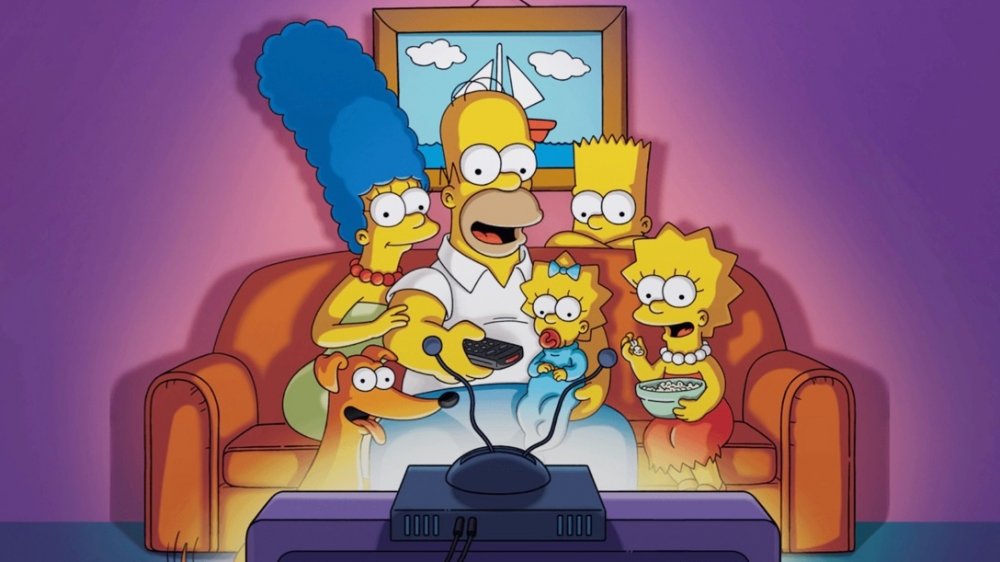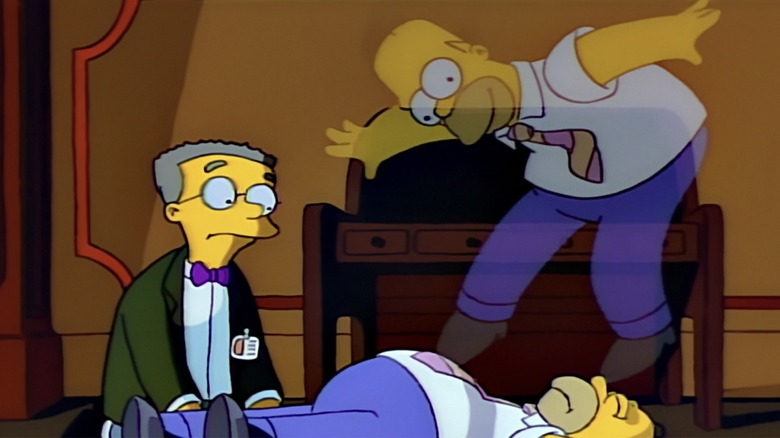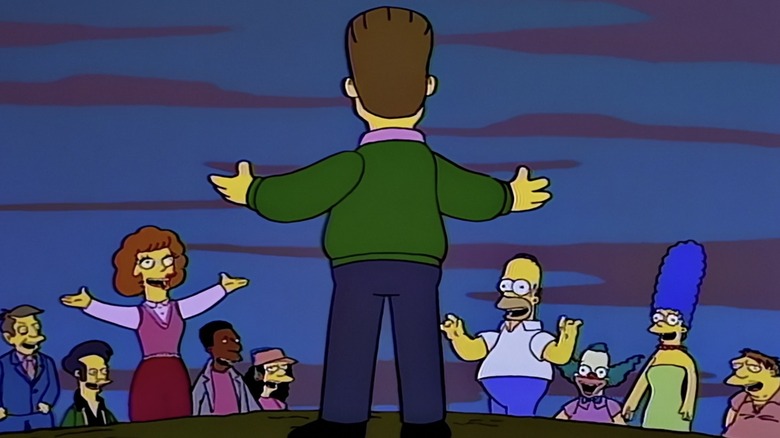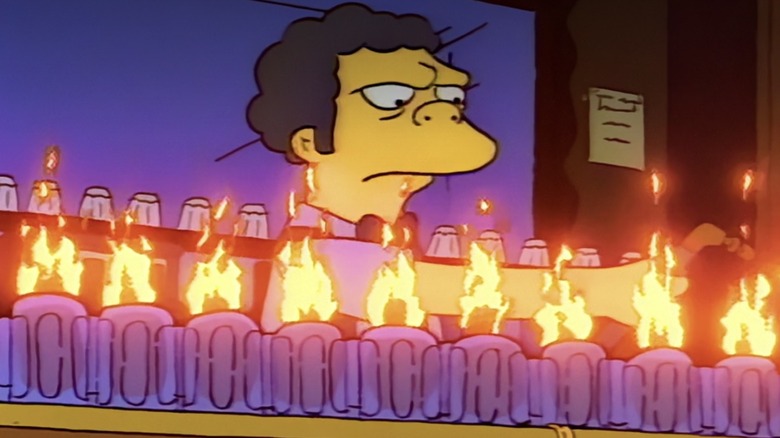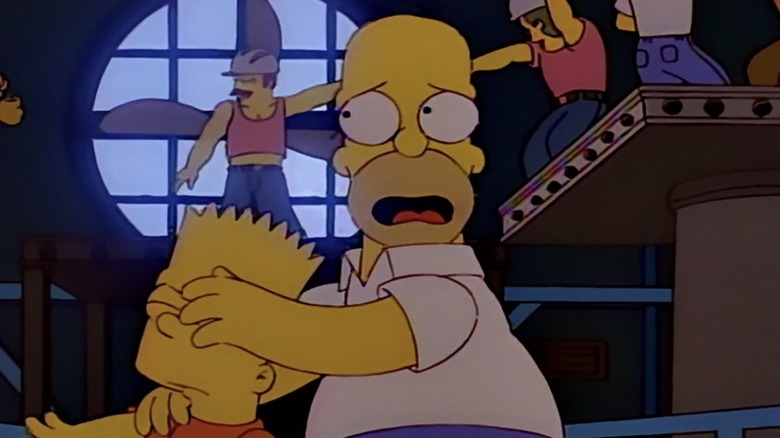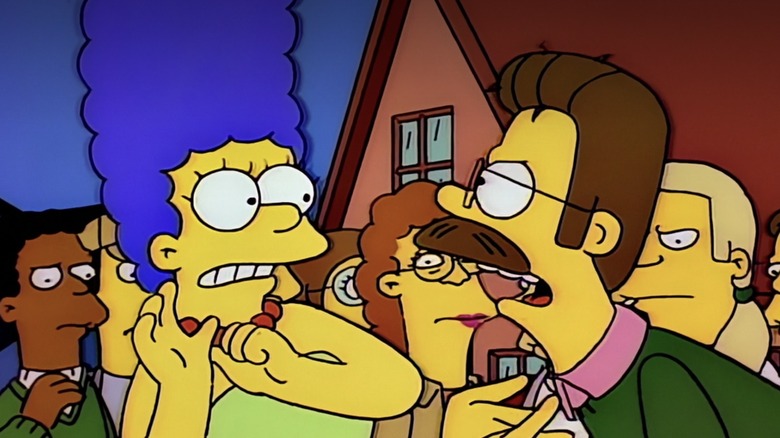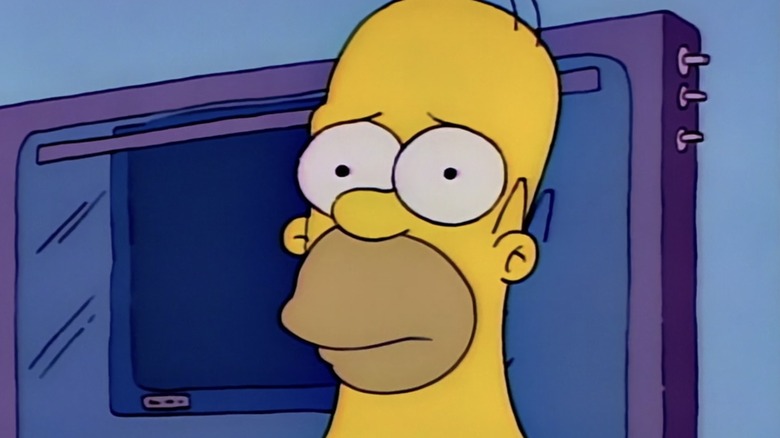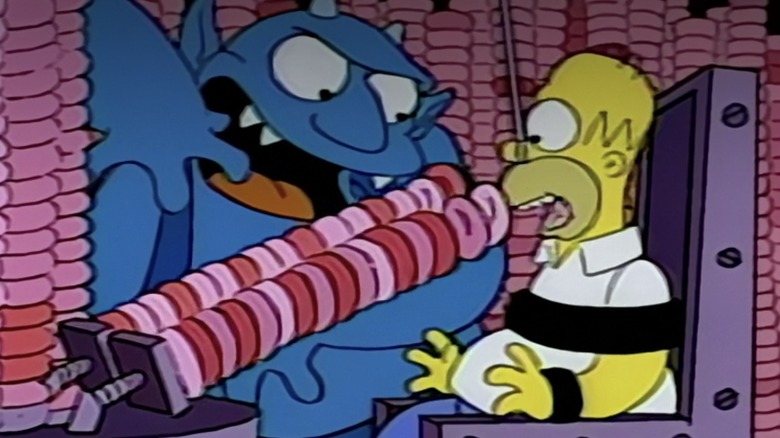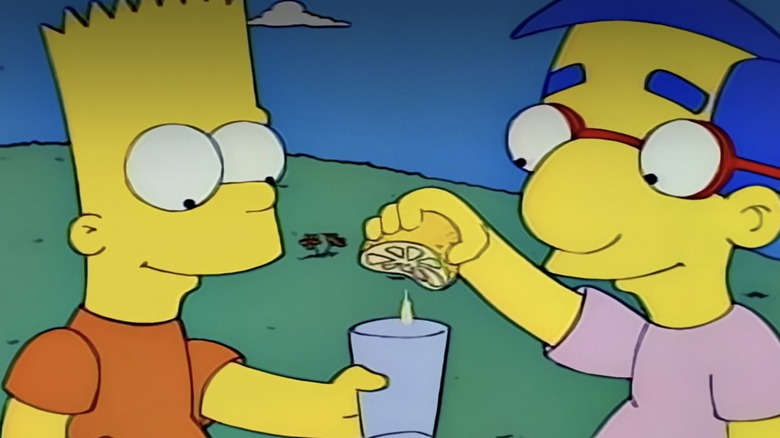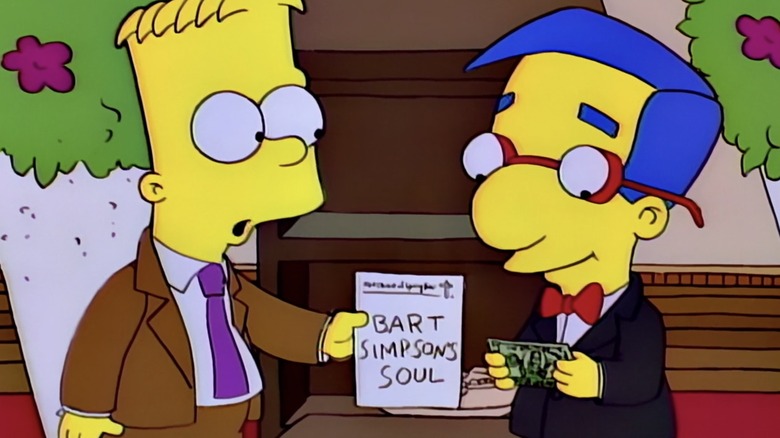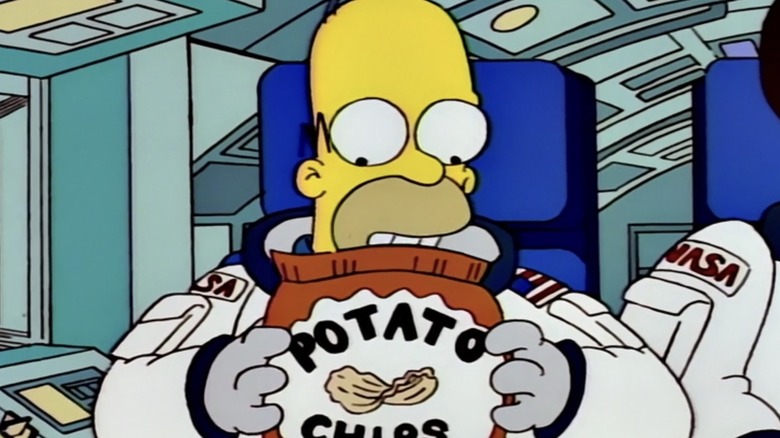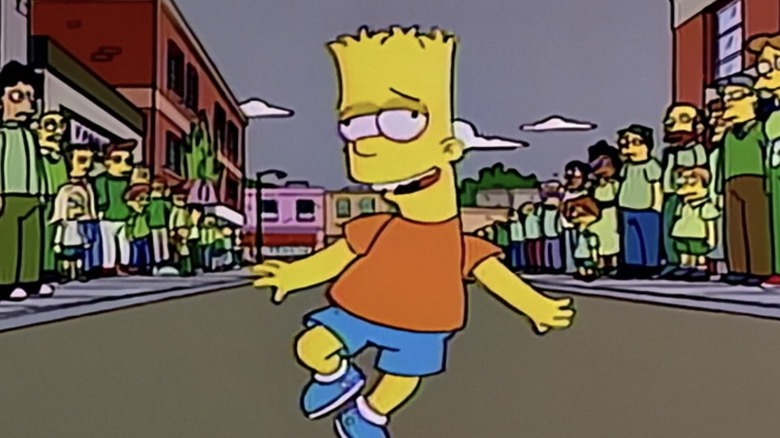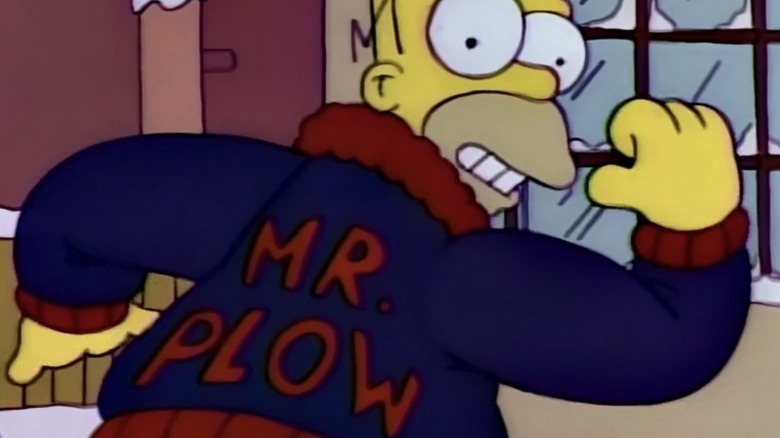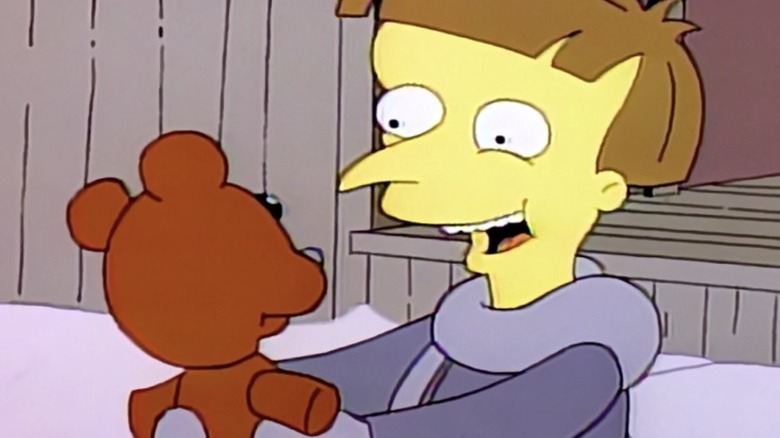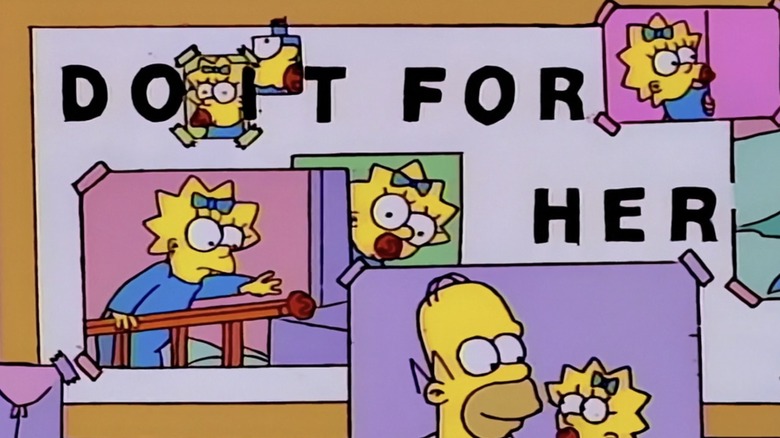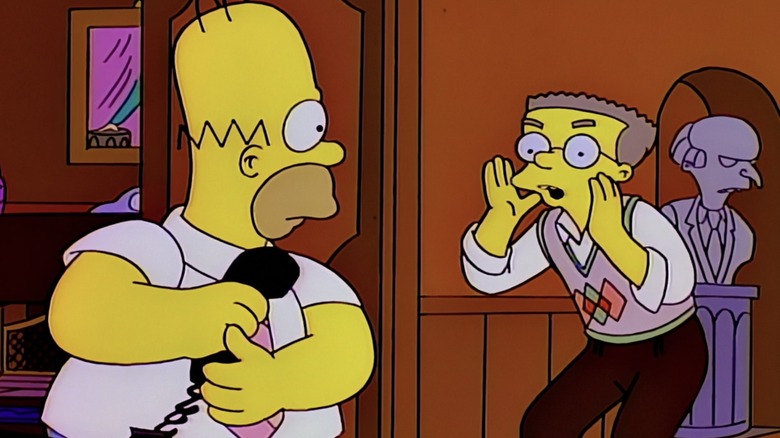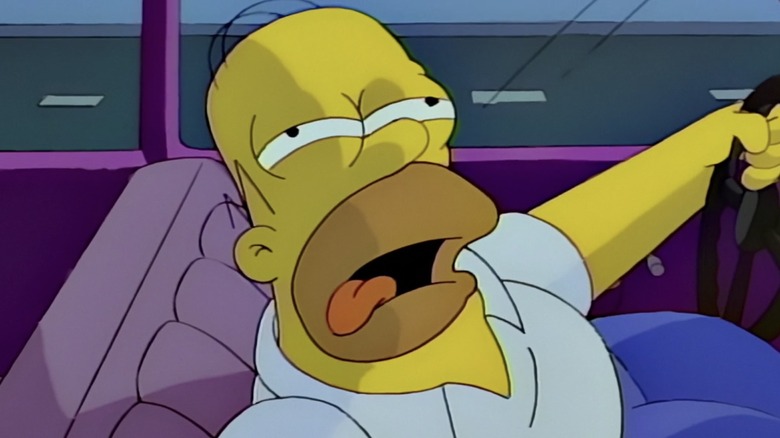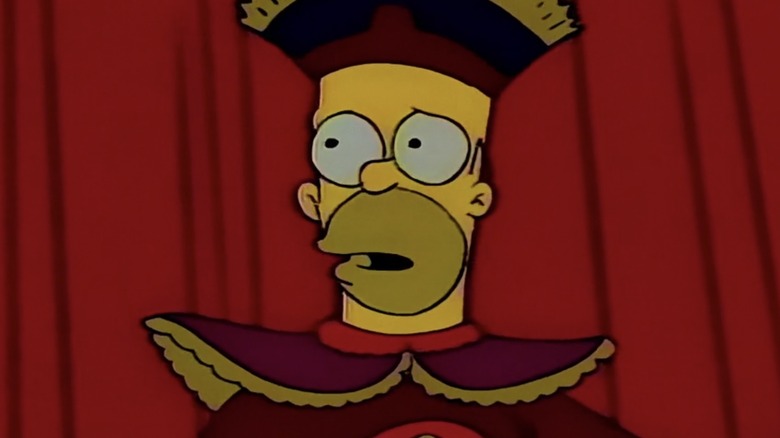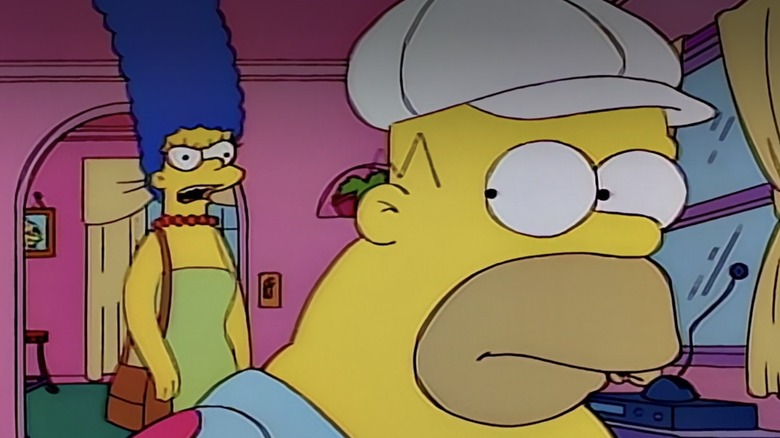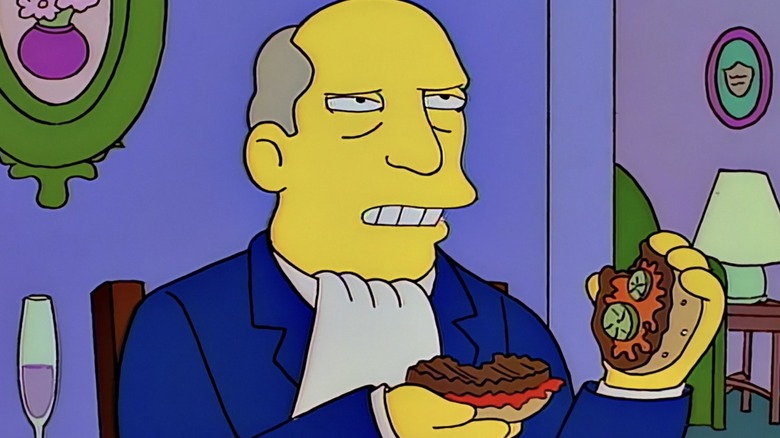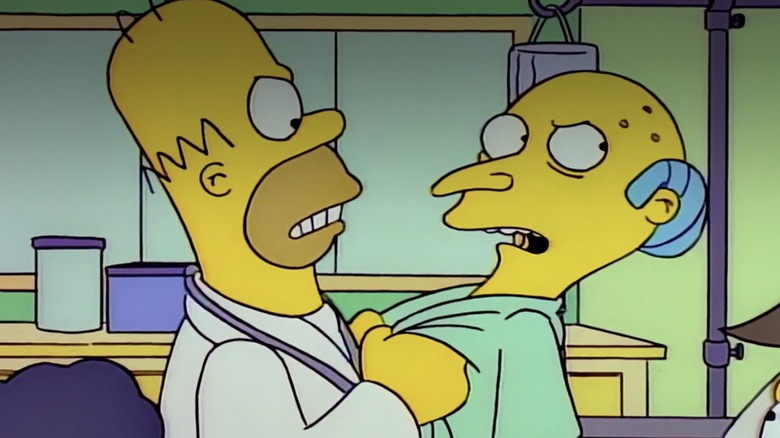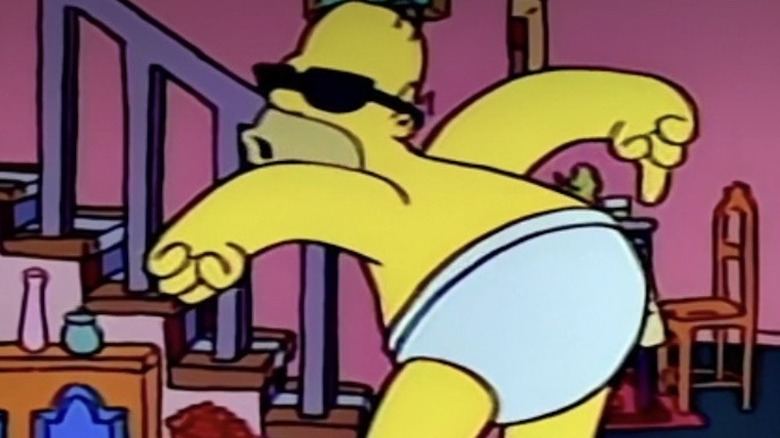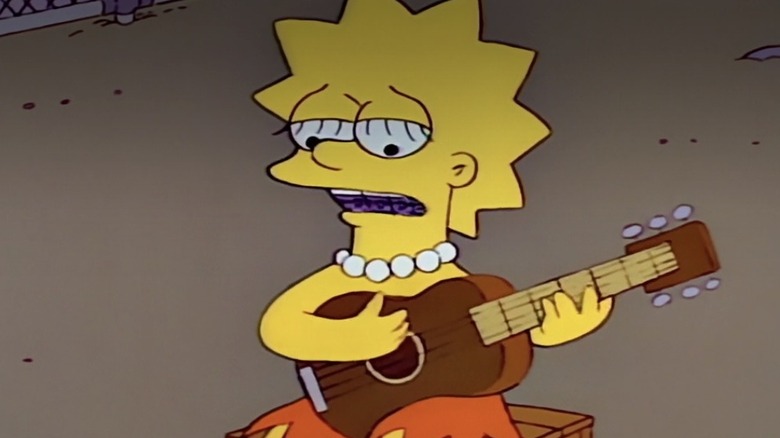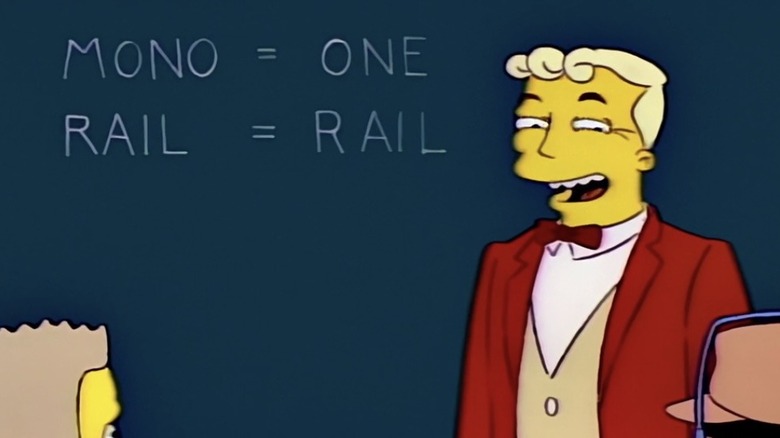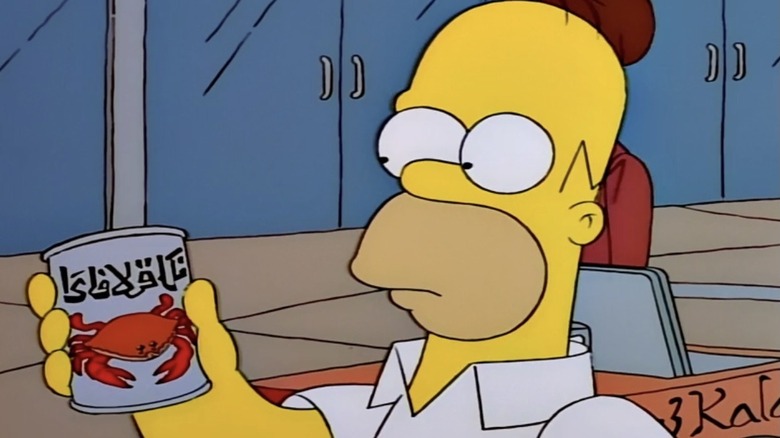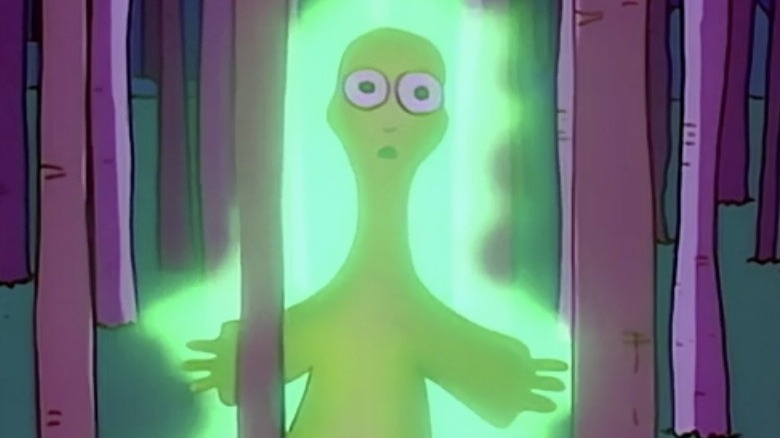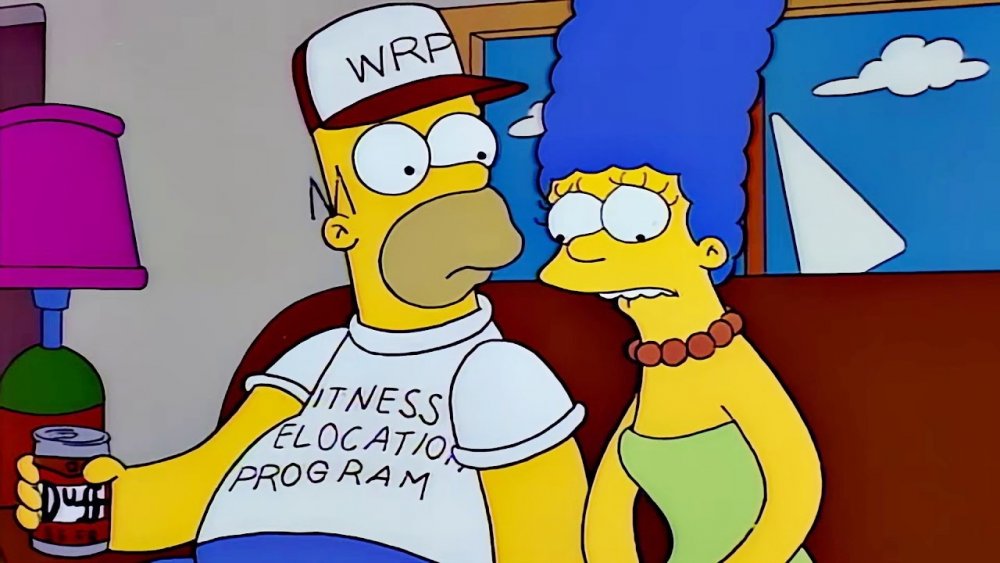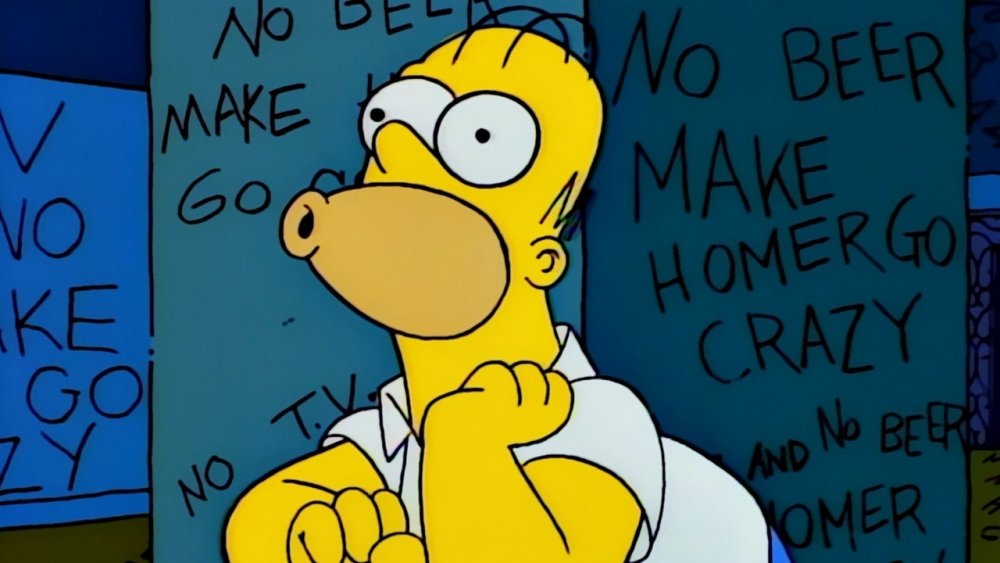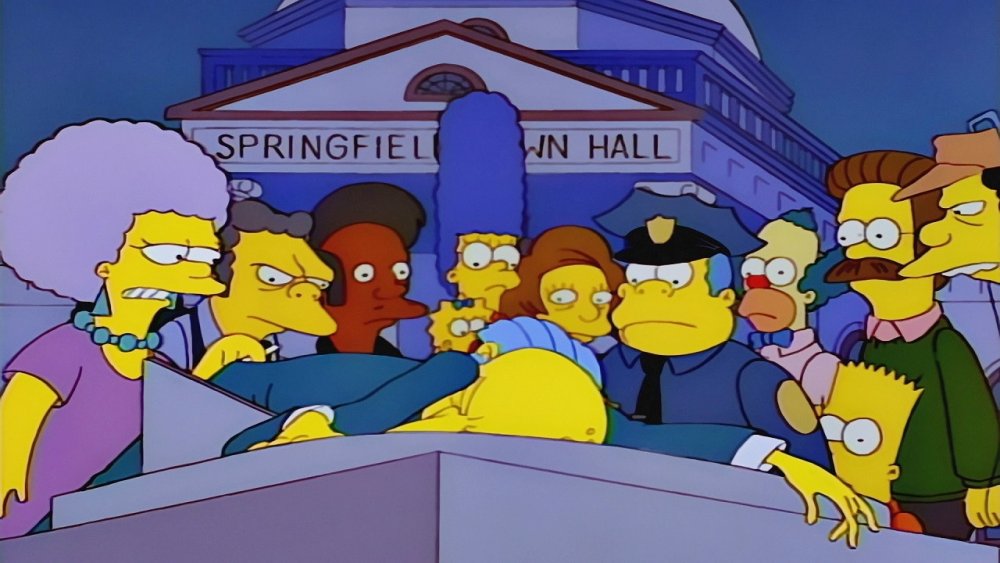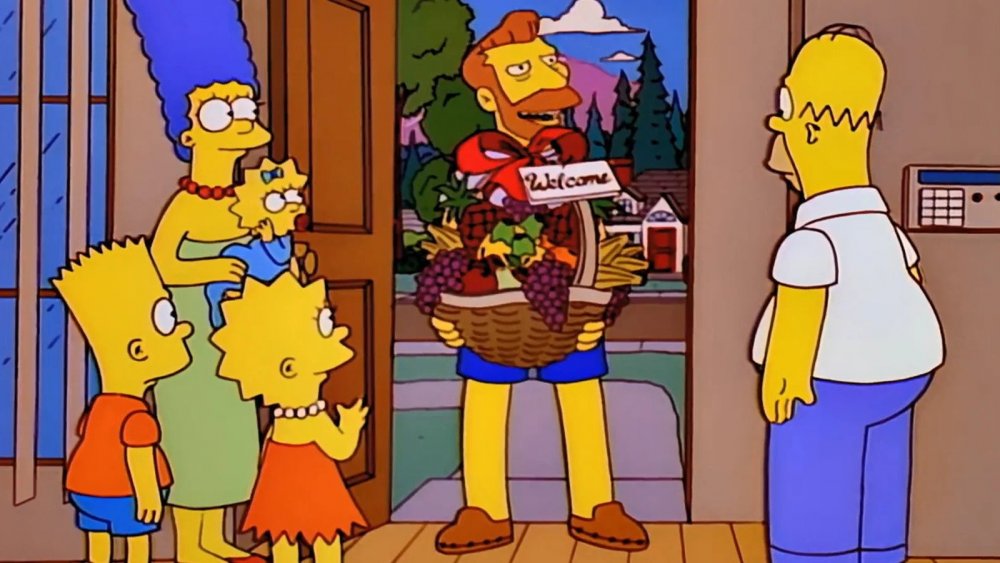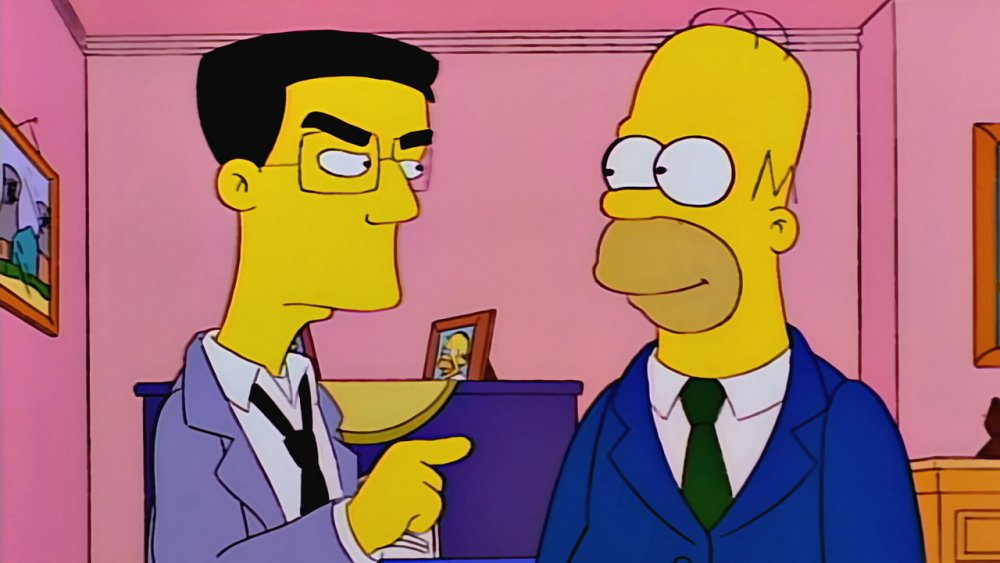30 Best Simpsons Episodes Ranked
When it comes to beloved, long-running animated series, it can be difficult to narrow down the best handful of episodes — and in the case of "The Simpsons" in particular, the task looks next to impossible. "Long-running" doesn't quite cover it; the show has been on the air longer than many people reading this have been alive, spanning 32 seasons and an unbelievable 700-plus episodes. "The Simpsons" is by far the longest-running primetime scripted television series in history; for perspective, the next-longest running, "Law & Order: Special Victims Unit," boasts "only" 22 seasons and just under 500 episodes.
The venerable website IMDb uses the votes of its registered users to rank pretty much every television episode ever made, and its top 10 episodes of "The Simpsons" shouldn't shock you in one respect: none of them were produced any later than Season Nine, after which it's widely postulated that the show became rather hit-and-miss. You may be surprised, though, to see which episodes are missing — but do keep in mind that with more than 700 episodes in its library, any non-comprehensive ranking will necessarily exclude some stone cold classics. Here, then, are the "Simpsons" installments voted as the absolute best by IMDb's users.
30. Homer's Triple Bypass (Season 4, Episode 11)
In this 1992 episode of "The Simpsons," Homer's unhealthy practices catch up with him. After eating a mountain of breakfast meats, he experiences chest pains, and on the way to work, dumbly assumes that his pounding heart is something wrong with his car. He continues to live in denial, even after the mechanic tells him that there's obviously something off about his heart. Once at work, Mr. Burns screams at Homer and threatens to fire him, the stress of which sends him over the edge into a heart attack. Homer briefly dies, right there on the floor of Mr. Burns' office, but, suggesting that the soul is a person's true essence, his spirit returns to his body when he hears Mr. Burns order Smithers to send a ham to his family.
Homer is hospitalized, and has yet another heart attack upon learning that a life-saving surgery will cost $30,000 — but actually $40,000, on account of the second incident. They have no choice but to employ the services of Dr. Nick Riviera, the jubilant but sketchy and barely licensed physician who will do any surgery for $129.95. But as is the case on many "Simpsons" episodes, it's Lisa, seemingly Springfield's only half-intelligent resident, who saves the day. While viewing her father's operation from the surgical theater, she gives the incompetent Dr. Nick instructions on what to do, as she'd taught herself the ins and outs of the operation from books.
29. Bart's Comet (Season 6, Episode 14)
Many hallmarks of "The Simpsons" are seen in the 1995 episode "Bart's Comet" — Bart humiliates Principal Skinner, the entire town fights amongst itself, and Homer bullies Ned Flanders into submission. The difference between this installment and others is the looming specter of death.
Bart is ordered to arrive at school before dawn to record coordinates for Principal Skinner as he recites them from a telescope — punishment for altering a high-flying weather balloon into "Big Butt Skinner." When the principal steps away for a minute, Bart spins the telescope at random, looks through it and discovers a massive object hurtling toward Springfield. Authorities respond by having Professor Drink shoot a missile at the celestial object; instead, it hits the only bridge out of town, trapping the panicked residents of Springfield as they await their fiery deaths from above. (Not Homer — he assures his family that the comet will burn up on entry and shrink to the size of a chihuahua's head.)
Ned Flanders prepares for the worst, hunkering down with his family in their bomb shelter. Before long, the whole town has exploited nice Ned's inability to turn anyone down, and they've all squeezed inside. It's so crowded, however, they have to let one person out, and it's Ned, of course. He bravely awaits his death, singing "Que Sera Sera," joined by the townsfolk as the comet arrives, which, like Homer said, burns up, breaks down, and lands next to a chihuahua, for scale.
28. Flaming Moe's (Season 3, Episode 9)
In "Flaming Moe's," Homer, usually the bad guy, is the one left hurt and disappointed when he's betrayed by a friend — although missing out on $1 million is probably what bothers him the most.
Homer shares with bartender Moe the secret recipe for a novelty cocktail he calls the Flaming Homer, which he invented one night to numb his brain during a visit from Marge's loathsome sisters, Patty and Selma. He combined the dregs from several liquor bottles with some Krusty-branded children's cough syrup. What really made it pop: Patty ashed her cigarette into Homer's cup, setting the drink on fire. Homer whips one up for Moe, who gives it to a customer and instantly takes credit for this "Flaming Moe."
Soon, the Flaming Moe is a huge fad, and Moe's becomes a trendy, packed nightclub. Homer goes mad with jealous rage, hallucinating the word "Moe" constantly and jumping up on the bar and revealing the drink's secret ingredient is cough syrup, leading a chain restaurant representative to rescind his $1 million offer to buy the recipe. With the instructions on how to make the Flaming Moe out in the open, every bar in town can serve it, and the crowds quickly disappear from Moe's. At least he and Homer can be friends again.
27. Homer's Phobia (Season 8, Episode 15)
The U.S. in the late '90s was not nearly as relatively tolerant as it is in the 2020s. For example, same-sex marriage wasn't legal, and LGBT representation on television amounted to about zero. Ellen DeGeneres made big strides when she (and her character on "Ellen") came out as a gay woman in the spring of 1997, two months after "The Simpsons" called out homophobia on the episode "Homer's Phobia."
Homer and Marge visit a kitschy gift shop at the mall and hit it off with its proprietor John (voiced by transgressive film legend John Waters), but Homer refuses to continue the friendship any longer when Marge points out that John is probably gay. Homer, expressing a deep-seated dislike of LGBT people, becomes paranoid that the whole world has a pro-homosexual agenda, and that it's going to turn Bart gay, somehow. He sets out to ensure Bart stays straight, sitting him down for hours in front of a sexy billboard and taking him to a steel mill, the most macho place he can imagine. That backfires, because this is an all-gay steel mill, as well as a men's dance club called the Anvil.
In one last effort, Homer takes Bart hunting, but they're attacked by deer. Who saves the day? John, scaring it off with a terrifying Santa Claus robot. Homer, his life saved by a gay man, finally realizes that gay people are just, well, people.
26. Hurricane Neddy (Season 8, Episode 8)
Ned Flanders may seem like a one-note character — a nice-to-a-fault, super-pious and incredibly lame neighbor who doesn't even know he's Homer Simpson's nemesis. In the 1997 episode "Hurricane Neddy," viewers finally get a Flanders origin story, with some background on why he acts the way he does (including his weird habit of adding "iddily" to most words).
It all hinges on an experience that Ned thinks is God testing him. Extremely adherent to his Christian faith and generally leading a blessed life, Ned can't understand why a hurricane would whip through Springfield and destroy only his house. After the whole town pitches in and rebuilds Ned's house, but so poorly that it immediately crumbles to the ground, he has a mental breakdown and tells everyone in Springfield what he really thinks of them. Institutionalized after his breakdown, therapy reveals that Ned Flanders only truly hates two people on Earth: his parents, a couple of "lousy beatniks." It would seem that little Ned Flanders was an unruly, cursing hellion, and the only thing that made him behave — but which turned him a smiling, doddering, rhyming pushover — was a months-long regimen of spanking from a psychiatrist.
25. One Fish, Two Fish, Blowfish, Blue Fish (Season 2, Episode 11)
In early 1991, "The Simpsons" was still figuring out its voice, still a slow-paced, working class family sitcom and not yet an edgy, satirical joke-fest. "One Fish, Two Fish, Blowfish, Blue Fish" helped steer things to the future, while also forcing viewers to grapple with the untimely death of Homer Simpson. The family grabs a sushi dinner at the Happy Sumo, and Homer finds he actually likes it, and even orders fugu, an infamous blowfish that, if improperly prepared, can fatally poison a diner. Well, Homer gets sick and is told by Dr. Hibbert that he's got less than 22 hours to live.
After cycling through the five stages of grief in a few seconds, Homer makes a bucket list. But he runs into some problems on his final day on Earth — he oversleeps and making peace with his needy father takes up too much time, and then he gets thrown in jail and hits up Moe's for a final beer.
Homer ultimately has just enough time to "be intamit with Marge" (so reads his list), and bid farewell to his sleeping children. He comforts himself in his final moments with the Bible — a book on tape version, as barked by Larry King. Miraculously, and as viewers could likely have predicted, Homer lives. He swears to use this gift wisely, to always "live life to the fullest." The episode's final image: Homer watching bowling on TV and eating pork rinds.
24. Treehouse of Horror IV (Season 5, Episode 5)
Beginning with its second season in 1990, "The Simpsons" has aired an annual Halloween anthology episode. Each highly anticipated "Treehouse of Horror" consists of three standalone tales of horror or weirdness, often parodying a famous scary story or movie. According to viewers, "Treehouse of Horror IV" is the best-ever Halloween installment of "The Simpsons."
Part one, "The Devil and Homer Simpson" retells the classic Faustian bargain story "The Devil and Daniel Webster." Homer sells his soul to Satan (Ned Flanders) in exchange for a donut. As long as he doesn't eat the whole thing, he'll stay out of Hell. Homer of course eats his forbidden soul donut after a matter of days and he's sent to the underworld, where he doesn't mind his ironic torture of being force-fed donuts. Lisa gets the Devil to hold a trial for Homer, and he wins his freedom, as Marge produces an old note promising her his eternal soul. Next up: "Terror at 5 1/2 Feet," a version of the famous episode of "The Twilight Zone" starring William Shatner as the only airplane passenger who sees a monster on the wing. In "Simpsons" land, it's Bart who sees a chaos monster messing with his school bus. The episode closes out with a gothic take on the Dracula story ... and the family singing "Hark! The Herald Angels Sing," just like at the end of "A Charlie Brown Christmas."
23. Lemon of Troy (Season 6, Episode 24)
There's a small and recurring tradition in TV comedies of small towns engaged in a bitter cold war with a hated, rival town. On "Parks and Recreation," Pawnee hates Eagleton, there was no love lost between Arlen and McMaynerberry on "King of the Hill," and on "The Simpsons," the hatred is mutual between Springfield and Shelbyville. In the 1995 episode "Lemon of Troy," viewers finally learn why the two towns hate each other so much, and what that nastiness can inspire.
Bart runs into Milhouse selling lemonade one day, and takes him to his lemon source: Springfield's beloved old town lemon tree, planted where town founder Jebediah Springfield started his namesake city. But alas, the tree has been stolen and the culprits are clearly those jerks from Shelbyville. Determined to head into enemy territory to retrieve the tree, the Springfield youth hear from Grampa Simpson the source of the rivalry: Jebediah Springfield and fellow pioneer Shelbyville Manhattan suffered a rift because the latter wanted to live in a place where people had the right to marry their attractive cousins; Springfield didn't share his opinion, and they started neighboring towns instead. The kids get the tree back and are treated as heroes, while in Shelbyville, the story goes that the lemon tree was kicked out of town because it was haunted.
22. Bart Sells His Soul (Season 7, Episode 4)
Bart Simpson has done a lot of short-sighted stuff — it's his whole deal, this pathological need to misbehave. In a 1995 episode of "The Simpsons," he commits an act that, according to one's personal belief system, is the worst, and most self-destructive thing possible, filling him immediately with panic and regret. It's right there in the title: "Bart Sells His Soul."
After pranking his church into singing the psychedelic rock classic "In-A-Gadda-Da-Vida," Bart's punishment is cleaning the church organ (alongside Milhouse, who snitched). Bart angrily dismisses the notion that the soul exists, and so he makes a quick five bucks writing "Bart's Soul" on a piece of paper and selling it to Milhouse. Bart soon feels off, his unease expressed in a legitimately spooky dream sequence where all the kids of Springfield pal around with their souls, then paddle boats together to the afterlife while Bart, soulless, gets left behind.
Milhouse won't give the soul back and by nightfall, Bart is inconsolable. He runs out of the family dinner at Uncle Moe's Family Feedback (Moe has briefly and disastrously converted his bar into a T.G.I. Friday's clone) and runs across town to get that piece of paper back. But alas, Milhouse has traded it to the Comic Book Guy. At the Android's Dungeon when it opens, Bart learns that the soul has been sold, filling Bart with even more dread ... until Lisa returns that important piece of paper.
21. Deep Space Homer (Season 5, Episode 15)
The concept of someone as incompetent, self-serving, and just plain stupid as Homer Simpson being trusted with billions of dollars worth of spaceflight technology and the lives of astronauts should be terrifying. But it's actually hilarious, because the 1994 episode "Deep Space Homer" is among "Simpsons" viewers' biggest favorites. Due to waning public interest in the space program, NASA sends Homer Simpson and his drinking buddy, Barney Gumble, into space. Why these two laze-abouts? Because Homer prank calls NASA from Moe's to complain that their last shuttle launch was boring, and after the agency traces the call, they hire Barney, who Homer blames for the call. When he confesses, NASA recruits him, too.
Only Homer successfully completes the prep, however — one sip of pre-launch celebratory champagne sends a newly sober Barney back into the depths of alcoholism, and he absconds with a NASA jet pack. Homer then heads to the cosmos with real-life astronaut Buzz Aldrin, but just about destroys the entire shuttle when he opens up a bag of smuggled potato chips and breaks an ant farm, sending crumbs and ants into the vehicle's precarious instrument panels. Homer and Aldrin get home safely thanks to some quick thinking and a savvily utilized carbon rod ... which winds up on the cover of "Time" instead of Homer.
20. Homer vs. the Eighteenth Amendment (Season 8, Episode 18)
"Homer vs. the Eighteenth Amendment," an episode that aired near St. Patrick's Day in 1997, might be an all-time "Simpsons" fan favorite if only for its devastating, darkly funny, and probably true final line. "To alcohol," Homer toasts, hoisting a beer, "the cause of, and solution to, all of life's problems."
Springfield had reason to celebrate, with alcohol sales and consumption legal again after a brief period of prohibition, an old law still on the books and newly enforced after a raucous St. Patrick's Day parade with so much booze shot out of hoses on the streets that 10-year-old Bart Simpson inadvertently got drunk.
With Homer unable to drink the several Duff Beers he consumed each day as a matter of course, he devised his own solution — bootlegging. First, he steals discarded beer from the city dump, pours it into the holes of bowling balls, and with an elaborate system of underground pipes, sends the vessels to Moe's, which becomes the hottest speakeasy in Springfield. Eventually, he runs afoul of Rex Banner, a 1930s-style lawman out to catch the previously anonymous "Beer Baron." He avoids punishment — tossed out of town via catapult — when the town clerk discovers that the long-standing prohibition that nobody remembered had also been quietly repealed years prior.
19. Mr. Plow (Season 4, Episode 9)
In cartoon land, time must behave differently. That's the only explanation for why nobody on "The Simpsons" seems to age, or how Homer Simpson has enough time in the day to pursue his various "lifelong dreams" or passing whims to try out other careers and odd side hustles. He's briefly held down dozens of random extra jobs, and the first test balloon into this running bit remains the most popular with "Simpsons" viewers — when Homer bought a snow-clearing rig and proclaimed himself "Mr. Plow."
Perhaps fans just love all the accoutrements of Homer's "Mr. Plow" persona, or the memorable episode bits — such as how Marge thinks it's sexy when Homer wears nothing but his "Mr. Plow" branded jacket and underpants, or the so-dumb-it's-smart jingle from a low-budget, late-night TV commercial: "Mr. Plow, that's my name. That name again is Mr. Plow." It's also possible that "Simpsons" viewers enjoyed it when Barney, Homer's barfly best friend, got up and did something with his life for a change, which in this case was to launch the rival "Plow King." But then he got famous pop star Linda Ronstadt to sing his jingle, which audaciously accuses Homer of being an alcoholic. At any rate, "Mr. Plow" is a fun episode, except for all the times when Homer faces real danger in the line of duty.
18. Rosebud (Season 5, Episode 4)
A lot of holes in Mr. Burns' backstory get filled in by the 1993 episode "Rosebud," which, as the title, shared with that of the fabled sled from "Citizen Kane" suggests, parodies the 1941 Orson Welles classic film about a tycoon who died longing for the innocence of childhood. Mr. Burns, now a rich and elderly tyrant, mutters "Bobo" in his sleep in earshot of Smithers (an unmistakeable "Kane" reference), and according to a flashback, that's the name of his long-lost totem, a teddy bear he had when his name was Happy, and he left his poor but doting parents to go live with the "twisted, loveless billionaire" who would shape him into the monster he'd become.
Then viewers get to see what became of Bobo. It changes hands between Charles Lindbergh and Adolf Hitler, and comes to rest in a block of ice in the North Pole, which is mined and then shipped to Springfield's Kwik-E-Mart. Bart buys a bag of ice, finds Bobo, and gives it to Maggie. After trying to negotiate with the Simpsons to hand it over — along with some robbery attempts — sweet-hearted Maggie hands it over to the hurting Mr. Burns. Does he pay this kindness forward, as he promises? No, of course not — he's Mr. Burns, after all.
17. And Maggie Makes Three (Season 6, Episode 13)
While it's almost universally agreed upon that "The Simpsons" is funny, on occasion it can display more tender emotions. The 1995 episode "And Maggie Makes Three" is just such an occasion. After thumbing through the family's photo albums, Lisa wonders why they lack pictures of baby Maggie. It's not, as one might assume, because Homer was too lazy to take photos and place them in an album.
In a flashback to two years earlier, the Simpsons are debt-free, enabling Homer to quit his loathed job at the Springfield Nuclear Power Plant in spectacular fashion — he drums on Mr. Burns' bald head and literally burns a bridge as he leaves the grounds. He moves on to his dream job, albeit a lower-paying one, working at the local bowling alley. In celebration, Homer and Marge get frisky, which results in an unexpected and unplanned pregnancy. With another mouth to feed, Homer is forced to return to the power plant and plead to be rehired. The vindictive and nasty Mr. Burns takes him back, with the caveat that Homer places a huge plaque near his desk that reads, "Don't forget: You're here forever." In order to make work tolerable, and to remind himself why he goes to a job he hates, Homer brings in every last picture of Maggie to put up on his wall and to obscure the sign so that it reads, "Do it for her." (No, you're crying.)
16. Homer the Smithers (Season 7, Episode 17)
Waylon Smithers is more than just the devoted, supplicant boot-lick to Mr. Burns. He's capable of supreme machination and manipulation to improve his own standing, and that's on display in "Homer the Smithers," one of the top-rated "Simpsons" episodes on IMDb. After leaving Mr. Burns alone in his car for a moment, during which time the old coot is traumatized when a drunken Lenny approaches to thank him for employee appreciation night, Smithers won't stop beating himself up. His increased groveling annoys Mr. Burns to the point where he sends him away on vacation, leaving Smithers to pick his own temporary replacement. He purposely picks the laziest, most unskilled, most unattractive nuclear plant worker he can find, to make some himself look great by comparison — and that's Homer Simpson, naturally.
Homer is indeed grossly incompetent — he somehow sets fire to every meal he prepares and he can't take Mr. Burns' verbal abuse the way Smithers can; in a moment of weakness, he punches his boss in the face, knocking him out. Burns so fears another such encounter that he forces himself to become independent and do all the things for himself that Smithers always did, putting the old assistant out of a job at the end of his vacation. He once more must conspire to restore the co-dependent relationship he shares with Mr. Burns.
15. Homer Badman (Season 6, Episode 9)
Homer Simpson is a lot of things — lazy, selfish, gluttonous, ignorant, a terrible father — but he isn't a lascivious man who tries to grope women who aren't his wife. That's the gist of the 1994 "Simpsons" episode "Homer Badman," in which the devoted husband must prove his innocence in a sexual harassment scandal that explodes into widespread tabloid coverage and public hatred.
Wanting to go to a candy expo and unable to secure any of their usual babysitters because they all hate Bart, Homer and Marge hire graduate student Ashley Grant. After the convention — from which Homer pilfered dozens of pounds of candy — he drives Ashley home. As she exits the car, he finds the one stolen sweet treat unaccounted for, a one-of-a-kind Venus de Milo in gummy form. It's stuck to the rear end of an unaware Ashley, and a drooling Homer reaches out for it, which she misinterprets as a crude advance.
Aghast, Ashley shows up to the Simpson home the next day with an angry mob that doesn't believe Homer's story. Then sleazy TV shows like "Rock Bottom" and a TV movie paint Homer as a predator, too. Ironically, it's surreptitious, illegal, and seedy behavior that exonerates Homer and clears his reputation. Groundskeeper Willie comes forward, admitting that he secretly tapes stuff all over Springfield, and he produces a video clearly showing Homer had interest in the "sweet, sweet candy" on Ashley, and not Ashley.
14. Homer the Great (Season 6, Episode 12)
Plenty of Americans have belonged to a fraternal organization, like the Freemasons or Elks, hybrid community service organizations and men's clubs. There also persists the idea that secret societies quietly rule over all aspects of life, such as the Illuminati. These two concepts converge in "Homer the Great," a classic episode of "The Simpsons" from 1995 in which Homer becomes a prominent figure in the Stonecutters.
What do the Stonecutters do, exactly? Well, according to their Emmy-nominated singalong "We Do," the ancient and mysterious order controls the British crown, prevented the metric system from taking hold, kept the existence of Atlantis and extraterrestrials secret, and launched the career of Steve Guttenberg. According to Homer, they also hold "beer busts, beer blasts, keggers, stein hoists, AA meetings," and rib night, which is when Homer offends the Stonecutters and also earns their praise. After he wipes his face with and destroys the Hallowed Sacred Parchment, he's forced to leave and stripped of his garments, which reveals his birthmark in the shape of the Stonecutters logo, indicating that he is their foretold leader, a Chosen One.
As head of the Stonecutters, Homer takes Lisa's suggestion and tries to introduce public service into the organization. It backfires, and all of the Stonecutters leave the organization to start a new, elite one in which Homer may not participate: the Ancient Mystic Society of No Homers.
13. King-Size Homer (Season 7, Episode 7)
Homer Simpson's stated, excessive weight of 239 pounds is the result of years of gluttonous consumption of donuts, fast food, bacon, and beer. He's also very lazy, and these deadly sins come together when Homer seeks to get out of a mandatory daily calisthenics activity at work. He learns that if he qualifies as disabled, he can skip the exercise and work from home — and morbid obesity is the disability he pursues. He dangerously overeats and quickly reaches his goal eight of 300 pounds thanks to Krusty Burger fish sandwiches (and a bit of play-clay), and despite Marge's fretting and lack of attraction to this new, muumuu-clad Homer, he gets a workstation installed in the living room and works about as hard as he does at the power plant — which is to say, not at all.
Homer's negligence leads to a core meltdown, and he rushes there to save the day, hijacking an ice cream truck (and eating its contents). He avoids mass catastrophe by falling into the gas storage tank, where the very large vent hole is filled perfectly by Homer's rotund body. Bart points out the irony that "for once, Dad's butt prevented the spread of toxic" fumes. Mr. Burns promises Homer to make him thin again, but after about a minute of frustrating calisthenics, he agrees to pay for liposuction and Homer turns back into regular, slightly overweight Homer.
12. 22 Short Films About Springfield (Season 7, Episode 21
Hitting the air in April 1996 — not long after "Pulp Fiction" popularized interwoven anthology collections — "22 Short Films About Springfield" zooms around town to tell the seldom-told tales of a day in the life of the strange "Simpsons" town. For example, Bart buys gum at the Kwik-E-Mart, which he chews and then accidentally throws into Lisa's hair. Marge tries to remove it by adding peanut butter and mayonnaise, which attracts bees, one of whom flies away and stings Smithers during a tandem bicycle ride with Mr. Burns. He's deathly allergic and manages to pedal himself to the hospital, where the staff admits the older, wealthier Mr. Burns.
After throwing some cash at the passed out Smithers, who he takes for a drunk, the shady Dr. Nick heads inside, and after testifying before a hospital ethics board, electrocutes Grampa Simpson back to life. Elsewhere around town, Homer gets baby Maggie stuck in a newspaper box, Chief Wiggum and Snake wind up gagged in Herman's shop (a nod to "Pulp Fiction"), Principal Skinner hosts Superintendent Chalmers for lunch and tries to pass off Krusty Burger fare as homemade "steamed hams," (the source of a popular meme) and Nelson laughs at a tall man in a tiny car, who forces the young bully to parade around down with his pants around his ankles while everyone laughs at him.
11. Who Shot Mr. Burns Part Two (Season 7, Episode 1)
After a long summer following a cliffhanger ending, viewers of "The Simpsons," as well as everyone in the town of Springfield, finally found out "Who Shot Mr. Burns" in the second part of this two-part riff on the "Who Shot J.R.?" craze from "Dallas" in 1980. Springfield Police, along with smartypants Lisa Simpson, discover that nearly every prominent figure in town had motive to harm wicked power plant tycoon C. Montgomery Burns, left for dead on a sundial in the town square shortly after he blocked out the sun. Smithers, arrested after confessing in a church confessional booth, thought he did the deed while drunk, but he actually shot Jasper's wooden leg. Willie's arthritic fingers preclude him from firing a gun, while Moe is exonerated by polygraph.
After drinking warm cream, Chief Wiggum has a "Twin Peaks"-esque dream and is inspired to look for more clues, and he finds an eyelash on Burns' suit that has Simpson DNA. Just then, the nearly dead Burns emerges from a coma and calls out "Homer Simpson!" Homer escapes police custody, and, still furious that Mr. Burns never remembers his name, holds a gun to his boss' head. It certainly doesn't look good for Homer, but then it turns out all Burns can say is "Homer Simpson." When he regains cognitive abilities, he identifies his would-be murderer: little Maggie Simpson. Well, a gun fell in her hands and it fired at Burns, at least.
10. Homer the Heretic (Season 4, Episode 3)
"The Simpsons" satirizes most every aspect of modern life, but it's been surprisingly soft and thoughtful on religion. "Homer the Heretic" does critique and tweak mainstream faiths while also suggesting that religion, at its best, can be a force for good. On a snowy Sunday morning, Homer doesn't want to get out of bed, and he certainly doesn't want to go to church. He refuses to go, so Marge and the kids brave the weather, and after a tedious service from Rev. Lovejoy, the doors are frozen shut and the furnace is broken. Left to his own devices for many hours, Homer has "the best day of [his] life," which he attributes to blowing off church. He uses the bathroom with the door open, dances in his underwear, makes his "Space Age Out of This World Moon Waffle," wins a radio contest, finds a penny, and watches "The Three Stooges" and football on TV. He pledges to never attend church again, and Marge is worried for Homer's soul, but he fancies himself a progressive religious leader after he has a dream in which God himself admits that Lovejoy is the worst and agrees to let Homer worship how he pleases.
That's all well and good, until Homer, on one of his Sunday morning one-man parties, falls asleep while smoking a cigar, which ignites a fire that just about burns his house down. He's saved by Springfield's fire brigade, made up of a pointedly multi-denominational crew of do-gooders.
9. Last Exit to Springfield (Season 4, Episode 17)
The Wrap cited "Last Exit to Springfield" as the best episode in the history of "The Simpsons." That's subjective, but it's hard to argue that it isn't the most "Simpsons" episode of all time. It addresses the struggles of blue-collar people, includes some of the worst things Mr. Burns has ever done, and the sight gags, lines, and bits flow furiously. It opens with a segment of the "McBain" in-universe action franchise, paralleling a drug lord with Mr. Burns, who all but admits he had his nuclear power plant's union leader murdered. He decides that his workers' contract is nothing but "flimshaw!" and he cuts the dental plan.
Meanwhile, a sadistic dentist scares Ralph Wiggum into flossing by showing him "The Big Book of British Smiles," then informs Lisa that she needs braces. At his next union meeting, where the dental plan has been exchanged for a keg of beer, Homer slowly realizes that to lose the dental plan means he'll have to pay for Lisa's braces — so he becomes union leader, and Mr. Burns mistakes his incompetence for masterful negotiation skills. The plant workers strike, and Lisa, outfitted with braces so old that she can't get them wet (following a "Yellow Submarine"-inspired laughing gas sequence) inspires with pro-labor fight songs. Mr. Burns shuts off the town's power in response, and is flabbergasted that the workers don't back down. He restores the dental plan, and Lisa gets better braces. The whole family laughs hysterically, not over the absurdity of the events, but because the dentist left the gas on.
8. Marge vs. the Monorail (Season 4, Episode 12)
"Marge vs. the Monorail" is packed with everything that makes an early episode of "The Simpsons" so special. For example, the plot hinges on Mr. Burns doing something evil, pop culture references abound, and it all ends in a town-wide debacle. After Mr. Burns dumps one too many drums of toxic waste from the Springfield Nuclear Power Planet in a park, he's busted and forced to pay the city $3 million.
Springfield holds a town meeting to determine what to do with the windfall. While Marge sensibly suggests they fix a cracked and broken Main Street (thanks to Homer's reckless driving), the town gets duped by huckster Lyle Lanley, a riff on Howard Hill from "The Music Man," who sells the town a shoddily constructed monorail system. The people of Springfield are convinced, as they often are, via a flashy Broadway-style musical number.
Lanley cuts corners, pocketing most of the $3 million and skipping town, but not before appointing Homer the monorail conductor. The thing is in such bad shape that a family of possums occupies the fire extinguisher cabinet (Homer calls the big one "Bitey") and during its maiden voyage, the brakes fail. Thinking quick, Homer yanks the "M" off the "Monorail" sign on the vehicle and uses it as an anchor to latch on to the Lard Lad donut. In some final narration, Marge lists the monorail among Springfield's greatest follies, alongside the popsicle stick skyscraper and the escalator to nowhere.
7. The City of New York vs. Homer Simpson (Season 9, Episode 1)
It's always an event when "The Simpsons are going to..." wherever it is they're headed in a travel episode, setting up fish-out-of-water hijinks and a chance for some hyper-local mockery at the expense of a particular locale. In the "The City of New York vs. Homer Simpson," the family ventures to New York City, a long bus journey, but a cheap one at a mere $9 a person. Homer is reluctant to go — he visited New York as a teenager, and he was mugged, fell in a manhole, and attacked by CHUDs. Once arrived, most of the family has a great time — Bart visits the wacky offices of MAD Magazine and Marge loves Broadway's "Kickin' It: A Musical Journey Through the Betty Ford Center."
Homer's time in the Big Apple is, once again, an ordeal. He's supposed to wait at the World Trade Center (Barney abandoned it there after a wild night) for a police officer to take the boot off the wheel. But then he drinks too many cans of crab juice, has to find a bathroom in one of the towers, and misses their arrival. Finally, he swipes a jackhammer from a construction worker and recklessly removes the boot himself, grabs his family, and high-tails it out of New York, seething as he drives while trash flies through his ruined windshield into his face. Naturally, "Theme from 'New York New York'" plays.
6. The Springfield Files (Season 8, Episode 10)
On "The Springfield Files," a 1997 episode of "The Simpsons," David Duchovny and Gillian Anderson of the "The X-Files" visit Springfield, in character as paranormal investigators Fox Mulder and Dana Scully. In a nod to more sci-fi franchises, Leonard Nimoy of "Star Trek" and the spooky documentary series "In Search Of..." starts off the installment as the host of a TV show about aliens, examining mysterious events that went down in Springfield. After a night of drinking at Moe's, Homer walks home but gets lost in the woods, which is where he encounters a glowing, wide-eyed alien and runs away screaming even though the creature totally tells him he wishes no harm. Nobody in Springfield believes Homer, on account of how he was drunk and his story is absurd, but the FBI gets wind of the news and sends Mulder and Scully to sleuth it out.
The alien reappears and his existence is confirmed, but this extraterrestrial promising peace and love is neither alien nor kind: It's Mr. Burns. Smithers explains that the nuclear power plant tycoon gets weekly treatments to prolong his life. Vocal cord scraping makes his voice high, the "love" message is one born of disorientation, and the green glow is because he's spent years in the nuclear power industry. Enjoying Mr. Burns while he's temporarily not the worst person in the world, the town joins him in a performance of the hippie love song "Good Morning Starshine" from the musical "Hair."
5. Cape Feare (Season 5, Episode 2)
Pretty much very episode to ever feature Bart's deadly nemesis Sideshow Bob (Kelsey Grammer) is a classic, but season 5's "Cape Feare" is special. A parody of the 1962 noir classic Cape Fear and its 1991 Martin Scorsese-directed remake, the episode sees the Simpsons entering the Witness Protection Program when Bob, who is plainly and unapologetically still obsessed with killing Bart, is released from prison. Taking on the surname Thompson (a brilliant gag involves a cop trying futilely to drill Homer's new name into his thick head), the family relocates to scenic Terror Lake, with Bob tagging along under their car.
Bob manages to corner Bart alone aboard the family's riverboat, but Bart — noticing that on its current course, the boat will soon arrive in Springfield — comes up with an amazing final request. He asks Bob to perform the score of the Gilbert and Sullivan opera H.M.S. Pinafore in its entirety, stalling him just long enough for the lazy river to deliver him into the waiting arms of the Springfield police.
The episode contains far too many classic gags to discuss here, but here's an interesting tidbit: the show's writers had difficulty stretching it out to a full 22 minutes. They remedied the situation by recycling an older couch gag (the longest in the show's history) and extending a bit of physical comedy wherein Sideshow Bob steps on a rake, sending the poor guy through a seemingly endless gauntlet of rakes. The gag would be referenced frequently throughout the show's history, such as in the season 12 episode "Day of the Jackanapes," in which Bob steps on a rake before uttering, "Rakes... my old arch-enemy."
4. Treehouse of Horror V (Season 6, Episode 6)
Many a Simpsons fan would make the case that pretty much every "Treehouse of Horror" Halloween episode is among the best ever, but IMDb users singled out one in particular: "Treehouse of Horror V," which aired during the sixth season. The episode's second and third segments are certainly awesome: in "Time and Punishment," Homer's toaster becomes a time machine, enabling him to make repeated sojourns into the past which screw mightily with the present; and in "Nightmare Cafteria," the staff of Springfield Elementary decide to cut corners on food costs by eating the students. But it's the first segment, "The Shinning," that really, er, shines.
The segment is, of course, a spoof of Stephen King's novel The Shining and Stanley Kubrick's film adaptation (but as Groundskeeper Willie points out, Bart shouldn't refer to his psychic ability as such, lest they all get sued). In it, the Simpson family are to take care of Mr. Burns' lodge for the winter, but Homer predictably goes all Jack Torrance on his family — not due to malevolent ghosts, but because of the lack of TV and beer.
In the segment's most inspired gag, Homer — being interrogated as to his mental state by Marge — isn't sure what he's just finished scrawling all over the walls ("No TV and no beer make Homer go crazy," a reference to the single sentence Torrance fills hundreds of pages with in the movie). He forgets the last two words, causing Marge to prompt him, "...go crazy?" To which Homer screams in response, "DON'T MIND IF I DO!"
"Treehouse of Horror V" is one of the darkest, bloodiest Simpsons Halloween episodes ever (Willie, for instance, is murdered with an axe in every single segment), but it should come as no surprise that it's also one of the funniest.
3. Who Shot Mr. Burns? Part One (Season 6, Episode 25)
The Simpsons season 6 concluded with the first part of the two-part episode, "Who Shot Mr. Burns?" which was modeled in part on the cliffhanger of the season 3 finale of the primetime soap opera Dallas (which had all of America wondering "Who shot J.R.?" for the better part of a year). The second part is, of course, also great (IMDb ranks it eleventh all-time), but part one is brilliant for how it deliberately sets up the central crime, dropping clues all the while, as the megalomaniac Mr. Burns methodically goes about pissing off literally everybody in Springfield.
It all begins when Burns uses slant drilling to siphon off a rich oil deposit recently discovered underneath Springfield Elementary, causing a domino effect which bankrupts the school, shuts down Moe's Tavern, and destroys the Springfield Retirement Castle. Having secured a virtual energy monopoly in the town, Burns unveils his master plan: to construct a giant disc that will block out the Sun, leaving all of Springfield totally dependent on him.
On top of these dastardly deeds, he enrages Homer by constantly forgetting his name, destroys Bart's treehouse (which even injures poor Santa's Little Helper), and even fires Smithers. The episode concludes with Burns activating his sun blocker at a town hall meeting, before exiting through an alley to be shot by... parties unknown. He then collapses on the town sundial, with his position giving a strong clue as to who his assailant was. We won't spoil the solution of the 25-year old mystery, but we will say that despite Burns' assertion early in the episode, taking candy from a baby isn't always as easy as one might think.
2. You Only Move Twice (Season 8, Episode 2)
The season 8 episode "You Only Move Twice" is notable for featuring one of the only other times the Simpsons have departed Springfield (with no Witness Protection Program involved this time), and for featuring one of the most memorable supporting characters in the show's history: Hank Scorpio, Homer's new boss at the Globex Corporation. Upon scoring his new gig, Homer convinces the family to move to the (much) nicer town of Cypress Creek. Unfortunately, virtually nothing about the town is as it seems — including Scorpio.
One by one, the Simpsons become severely disenchanted with their new town: Bart finds himself in a remedial class at his new school; Lisa finds that the town's pristine nature preserves are of no use to her, since she's allergic to all the wildlife; and the family's new self-cleaning home leaves Marge bored (and drunk) out of her skull. Oh, and while he's a great boss who listens with interest to Homer's dream of one day owning the Dallas Cowboys, it turns out that Scorpio is a full-on James Bond villain (sorry, that's James Bont) with designs on seizing control of the entire East Coast.
"You Only Move Twice" is chock full of inspired gags, not the least of which is the one which closes the episode. After Homer dejectedly moves the family back home, he's disappointed to find that Scorpio has sent him a parting gift: the Denver Broncos, which are depicted as a team of bumbling oafs. Okay, so the gag didn't age terribly well; just over a year after the episode's airing, the Broncos finally won their first championship, a 31-24 victory over Green Bay in Super Bowl XXXII.
1. Homer's Enemy (Season 8, Episode 23)
The Simpsons episode voted the best ever by IMDb's users is also, without question, the absolute darkest installment of the whole series: season 8's "Homer's Enemy," in which a new hire at the Springfield Nuclear Power Plant, Frank Grimes (voiced by Hank Azaria) strikes up a vendetta against Homer that ends... poorly for him. A level-headed, sensible man, Grimes (or "Grimey," as Homer calls him to his endless annoyance) becomes increasingly enraged over the fact that Homer is well-liked and lives a comfortable life, despite his obvious and flagrant incompetence. Grimes declares himself to be Homer's enemy — but of course, his every attempt to cut the buffoon down to size backfires terribly.
This culminates in a classic sequence late in the third act, in which Grimes — halfway out of his mind with rage and exasperation — goes nuts in the power plant, mimicking and brutally mocking Homer's typical behavior. ("I can be lazy too!" he screams at some random employees while mooning them. "Look at me! I'm a worthless employee, just like Homer Simpson! Give me a promotion!") His rampage goes on for several minutes while his co-workers look on in confusion, until finally, he happens across a set of high voltage wires. "What's this? Extremely high voltage," he says. "Well, I don't need safety gloves, because I'm Homer Simp-" He grabs the wires with his bare hands, there's a crackling sound — and we smash cut to Grimes' grave.
Yep, that's right — the whole town is at Grimes' funeral, including Homer, who falls asleep as Reverend Lovejoy eulogizes "Frank Grimes, or Grimey, as he liked to be called." It's a jaw-dropping conclusion to an episode that reminds us that, at its best, The Simpsons could be mercilessly funny — not to mention just plain merciless.
